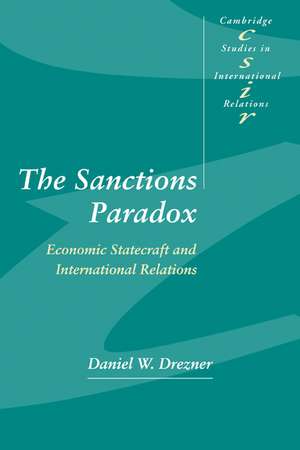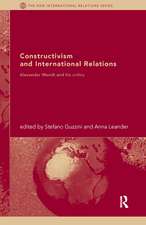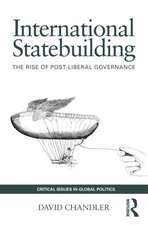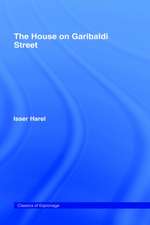The Sanctions Paradox: Economic Statecraft and International Relations: Cambridge Studies in International Relations, cartea 65
Autor Daniel W. Drezneren Limba Engleză Paperback – 25 aug 1999
| Toate formatele și edițiile | Preț | Express |
|---|---|---|
| Paperback (1) | 387.51 lei 6-8 săpt. | |
| Cambridge University Press – 25 aug 1999 | 387.51 lei 6-8 săpt. | |
| Hardback (1) | 848.22 lei 6-8 săpt. | |
| Cambridge University Press – 25 aug 1999 | 848.22 lei 6-8 săpt. |
Din seria Cambridge Studies in International Relations
-
 Preț: 200.87 lei
Preț: 200.87 lei -
 Preț: 232.37 lei
Preț: 232.37 lei -
 Preț: 237.58 lei
Preț: 237.58 lei -
 Preț: 198.90 lei
Preț: 198.90 lei -
 Preț: 210.70 lei
Preț: 210.70 lei -
 Preț: 190.01 lei
Preț: 190.01 lei -
 Preț: 200.79 lei
Preț: 200.79 lei - 8%
 Preț: 401.24 lei
Preț: 401.24 lei -
 Preț: 229.56 lei
Preț: 229.56 lei -
 Preț: 265.70 lei
Preț: 265.70 lei -
 Preț: 200.09 lei
Preț: 200.09 lei -
 Preț: 207.82 lei
Preț: 207.82 lei -
 Preț: 158.77 lei
Preț: 158.77 lei -
 Preț: 162.49 lei
Preț: 162.49 lei -
 Preț: 231.47 lei
Preț: 231.47 lei - 11%
 Preț: 584.77 lei
Preț: 584.77 lei -
 Preț: 241.77 lei
Preț: 241.77 lei -
 Preț: 287.87 lei
Preț: 287.87 lei -
 Preț: 209.13 lei
Preț: 209.13 lei -
 Preț: 299.23 lei
Preț: 299.23 lei -
 Preț: 286.13 lei
Preț: 286.13 lei -
 Preț: 287.87 lei
Preț: 287.87 lei - 11%
 Preț: 641.67 lei
Preț: 641.67 lei - 11%
 Preț: 585.78 lei
Preț: 585.78 lei - 14%
 Preț: 843.23 lei
Preț: 843.23 lei -
 Preț: 303.80 lei
Preț: 303.80 lei -
 Preț: 284.78 lei
Preț: 284.78 lei -
 Preț: 279.76 lei
Preț: 279.76 lei -
 Preț: 285.75 lei
Preț: 285.75 lei -
 Preț: 324.24 lei
Preț: 324.24 lei -
 Preț: 290.16 lei
Preț: 290.16 lei -
 Preț: 291.69 lei
Preț: 291.69 lei -
 Preț: 392.52 lei
Preț: 392.52 lei -
 Preț: 315.99 lei
Preț: 315.99 lei
Preț: 387.51 lei
Nou
Puncte Express: 581
Preț estimativ în valută:
74.16€ • 77.14$ • 61.22£
74.16€ • 77.14$ • 61.22£
Carte tipărită la comandă
Livrare economică 12-26 aprilie
Preluare comenzi: 021 569.72.76
Specificații
ISBN-13: 9780521644150
ISBN-10: 0521644151
Pagini: 364
Ilustrații: 4 b/w illus. 1 map 37 tables
Dimensiuni: 153 x 228 x 22 mm
Greutate: 0.59 kg
Ediția:New.
Editura: Cambridge University Press
Colecția Cambridge University Press
Seria Cambridge Studies in International Relations
Locul publicării:Cambridge, United Kingdom
ISBN-10: 0521644151
Pagini: 364
Ilustrații: 4 b/w illus. 1 map 37 tables
Dimensiuni: 153 x 228 x 22 mm
Greutate: 0.59 kg
Ediția:New.
Editura: Cambridge University Press
Colecția Cambridge University Press
Seria Cambridge Studies in International Relations
Locul publicării:Cambridge, United Kingdom
Cuprins
1. Introduction; Part I. Theory and Data: 2. A model of economic coercion; 3. Plausibility probes; 4. Statistical tests; Part II. Economic Coercion in the Former Soviet Union: 5. Russian power and preferences; 6. The extent of NIS concessions; 7. Evaluating the evidence; Part III. Choosing Between Carrots and Sticks: 8. Economic statecraft and nuclear proliferation on the Korean Peninsula; 9. Conclusions, implications, speculations.
Recenzii
'The Sanctions Paradox is one of the best books written in the field of international political economy during the 1990s. It offers a simple but clever theory that explains when states are likely to employ economic sanctions and when they are likely to work. Since sanctions seem destined to remain a favourite tool of statecraft in the 21st century, this book is likely to be paid serious attention for years to come.' John Mearsheimer, University of Chicago
Descriere
This 1999 argues that, paradoxically, countries are likely to use sanctions under conditions where they will produce the feeblest results.

















